
Candida Martinelli's Italophile Site

Main
Page This family-friendly site celebrates Italian culture for the enjoyment of children and
adults. Site-Overview
Mother Goose Rhymes and
Riddles
Project Gutenberg Books
Online - Kate Greenaway Books with Illustrations
Edward
Lear was a 19th century English poet and illustrator. He was
playful with the English language, often coining new words and writing
nonsensical poetry. He was the Dr. Seuss of his time. Some words
you’ll need to know for when your children ask, “What does that mean?”:
Five-pound note, shilling - British money
Bong-tree - a plant invented by Lear, that grows in the imaginary
Great Gromboolian Plain
Runcible spoon - coined by Lear, a three-pronged fork, curved like a
spoon, with a cutting edge
The Owl
and the Pussy-cat went to sea
In a beautiful pea-green boat: They took
some honey, and plenty of money
Wrapped up in a five-pound note. The Owl
looked up to the stars above,
And sang to a small guitar, “O lovely
Pussy, O Pussy, my love,
What a beautiful Pussy you are,
You are,
Your are!
What a beautiful Pussy you are!” Pussy said
to the Owl, “You elegant fowl,
How charmingly sweet you sing! Oh! Let us
be married; too long we have tarried:
But what shall we do for a ring?” They
sailed away, for a year and a day,
To the land where the bong-tree grows;
And there
in a wood a Piggy-wig stood,
With a ring at the end of his nose,
His nose,
His nose,
With a ring at the end of his nose. “Dear Pig,
are you willing to sell for one shilling
Your ring?” Said the Piggy, “I will.” So they
took it away, and were married next day
By the turkey who lives on the hill. They dined
on mince and slices of quince,
Which they ate with a runcible spoon; And hand
in hand, on the edge of the sane,
They danced by the light of the moon,
The moon,
The moon,
They danced by the light of the moon. Eugene
Field was a late 19th century poet and journalist from St.
Louis, Missouri. He wrote a daily newspaper column and authored several
books of verse. He was especially good at writing verse for children.
Wynken,
Blynken and Nod is called a Dutch Lullaby because it’s
supposed to be what a Dutch parent would sing to a child at bedtime.
Mr. Lear’s other famous children’s poem is
Little Boy Blue. These
words are explained in the last stanza of the poem, but in case you
can’t wait: Wynken
is Dutch for winking.
Blynken is Dutch for blinking. Nod is
Dutch and English for nod, as in nodding your head, or going to the
Land of Nod (sleep).
Dutch
Lullaby - Wynken Blynken and Nod Wynken,
Blynken, and Nod one night
Sailed off in a wooden shoe,-- Sailed on
a river of crystal light
Into a sea of dew. “Where are
you going, and what do you wish?”
The old moon asked the three. “We have
come to fish for the herring fish
That live in this beautiful sea;
Nets of silver and gold have we!”
Said Wynken,
Blynken,
And Nod. The old
moon laughed and sang a song,
As they rocked in the wooden shoe; And the
wind that sped them all night long
Ruffled the waves of dew. The little
stars were the herring fish
That lived in that beautiful sea-- “Now cast
your nets wherever you wish,--
Never afeard are we!”
So cried the stars to the fishermen three,
Wynken,
Blynken,
And Nod. All night
long their nets they threw
To the stars in the twinkling foam,-- Then down
from the skies came the wooden shoe,
Bringing the fishermen home: ‘Twas all
so pretty a sail, it seemed
As if it could not be; And some
folk thought ‘twas a dream they’d dreamed
Of sailing that beautiful sea;
But I shall name you the fishermen three:
Wynken,
Blynken,
And Nod. Wynken and
Blynken are two little eyes,
And Nod is a little head, And the
wooden shoe that sailed the skies
Is a wee one’s trundle-bed; So shut
our eyes while Mother sings
Of wonderful sights that be, And you
shall see the beautiful things
As you rock in the misty sea
Where the old shoe rocked the fishermen three:--
Wynken,
Blynken,
And Nod.
Mother
Goose is synonymous with nursery rhymes, and since no one is really sure
where the name came from, it can be used loosely. However, the rhymes
and riddles printed in England back in the 1700s are usually considered
the classics. You can
read them all on-line at
Amherst’s website. Here are a few for fun.
This Little Pig Went to Market
This little pig went to market;
Peter Piper
Peter Piper picked a peck of pickled peppers;
As I Was Going to St. Ives
As I was going to St. Ives, (One, only
the one telling the story was ‘going to St. Ives’) I
Saw a Ship A-Sailing
I saw a ship a-sailing,
There were comfits in the cabin,
The four and twenty sailors,
The captain was a duck,
Monday’s Child…
Monday's child is fair of face, Pinocchio
is the third most popular book ever written. It’s been printed in over
200 languages, and it has never been out of print since it’s original
publication in 1883. It’s been made into countless plays and films. The
original text of the 300-plus page book is available to read on-line in
PDF form, illustrated with photographs. You can read it on-line or
save the PDF book to your computer to read to your child, or for your
child to read. If you
prefer to just read the text only, on-line in html format, you can do
that at the
Free Library. Here’s how
the story begins. The
Adventures of Pinocchio
Centuries
ago there lived…
"A king!"
my little readers will say immediately.
No,
children, you are mistaken. Once upon a time there was a piece of
wood. It was not an expensive piece of wood. Far from it. Just a
common block of firewood, one of those thick, solid logs that are put on
the fire in winter to make cold rooms cozy and warm.
I do not
know how this actually came to happen, yet the fact remains that one
fine day this piece of wood found itself in the shop of an old
carpenter. His real name was Master Antonio, but everyone called him
Master Cherry, for the tip of his nose was so round and red and shiny
that it looked like a ripe cherry. As soon as
he saw that piece of wood, Master Cherry was filled with joy. Rubbing
his hands together happily, he mumbled half to himself:
"This has
come in the nick of time. I shall use it to make the leg of a table."
He grasped
the hatchet quickly to peel off the bark and shape the wood. But as he
was about to give
"Please be
careful! Do not hit me so hard!"
What a
look of surprise shone on Master Cherry's face! His funny face became
still funnier. He turned frightened eyes about the room to find out
where that wee, little voice had come from and he saw no one! He looked
under the bench…no one! He peeped inside the closet--no one! He
searched among the shavings… no one! He opened the door to look up and
down the street…and still no one! "Oh, I
see!" he then said, laughing and scratching his wig. "It can easily be
seen that I only thought I heard the tiny voice say the words! Well,
well, to work once more." He struck
a most solemn blow upon the piece of wood.
"Oh, oh!
You hurt!" cried the same far-away little voice.
Master
Cherry grew dumb, his eyes popped out of his head, his mouth opened
wide, and his tongue hung down on his chin. As soon as he regained the
use of his senses, he said, trembling and
"Where did
that voice come from, when there is no one around? Might it be that
this piece of wood has learned to weep and cry like a child? I can
hardly believe it. Here it is, a piece of common firewood, good only to
burn in the stove, the same as any other. Yet, might someone be hidden
in it? If so, the worse for him. I'll fix him!" With these
words, he grabbed the log with both hands and started to knock it about
unmercifully. He threw it to the floor, against the walls of the room,
and even up to the ceiling.
He
listened for the tiny voice to moan and cry. He waited two
minutes…nothing; five minutes…nothing; ten minutes…nothing.
"Oh, I
see," he said, trying bravely to laugh and ruffling up his wig with his
hand. "It can easily be seen I only imagined I heard the tiny voice!
Well, well, to work once more!"
He set
aside the hatchet and picked up the plane to make the wood smooth and
even, but as he drew it to and fro, he heard the same tiny voice. This
time it giggled as it spoke: "Stop it!
Oh, stop it! Ha, ha, ha! You tickle my stomach."
This time
poor Master Cherry fell as if shot. When he opened his eyes, he found
himself sitting on the floor.
His face
had changed; fright had turned even the tip of his nose from red to
deepest purple. End of
Chapter 1 of The Adventures of Pinocchio
This wonderful online library of books includes the texts of children's
books to read online, with the original illustrations. Here is
just a sampling, but do a search of your own, and then click on the HTML
version that is not zipped, so you can read it online.
Humpty Dumpty (a long version of the Mother Goose poem, with lots of
colorful illustrations)
Aunt
Friendly's Picture Book (classic children's stories with colorful
illustrations)
Nursery Stories and Rhymes (lots of colorful images)
Kate Greenaway Books
A
Apple Pie (an alphabet book with all the illustrations dealing with
an apple pie - cute!)
Marigold Garden (full of delicate illustrations that accompany
children's rhymes)
Mother Goose or Old Nursery Rhymes (each illustrated with one of
Greenaway's delicate designs)
Robert Browning's Pied Piper of Hamelin (fully illustrated story)
Bret
Harte's Queen of Pirate Isle (longer text for older children,
illustrations very cute for little girls)
Under
the Window, Pictures and Rhymes for Children (charming illustrations
of children at play)
Classic children’s poetry and stories
are long out of copyright, which means they are available on-line for
free. The
Rosetta Project is the best place to start. It is the largest
collection of antique children’s books in English on-line.
Candida Martinelli's
Italophile Site
Classic
Poetry and Stories for Children - The Best Things in Life are Free
![]()
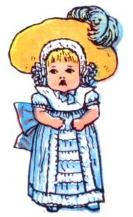
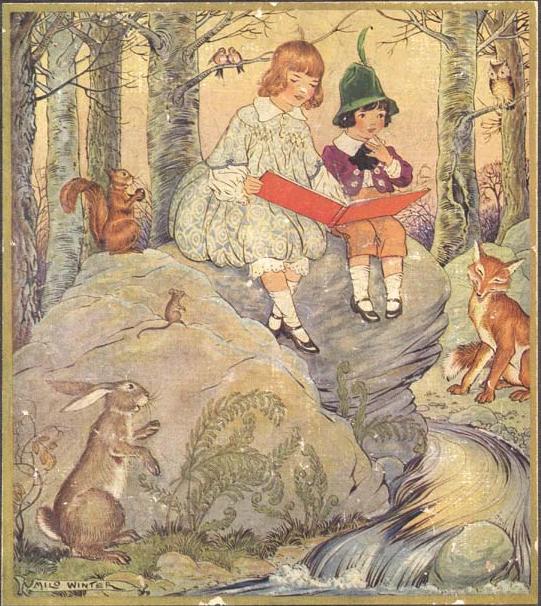
The Owl and the
Pussycat by Edward Lear
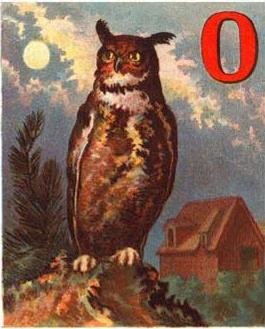 The
Owl and the Pussycat
The
Owl and the Pussycat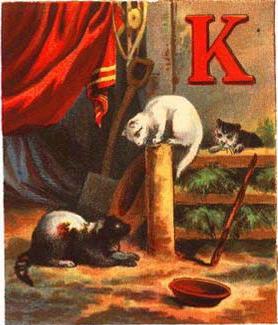
Dutch
Lullaby - Wynken, Blynken and Nod by Eugene Field
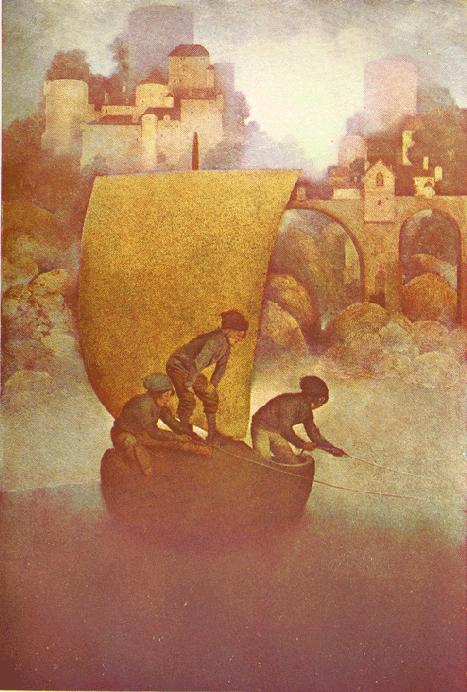
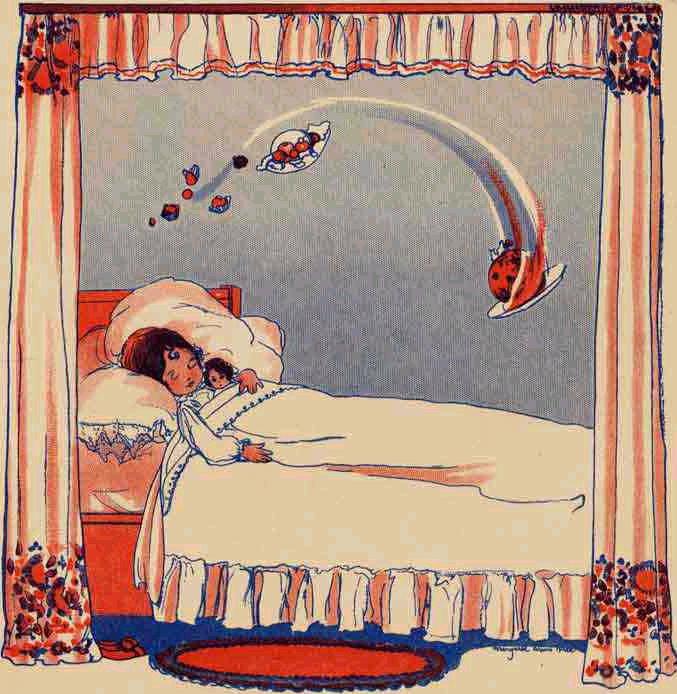
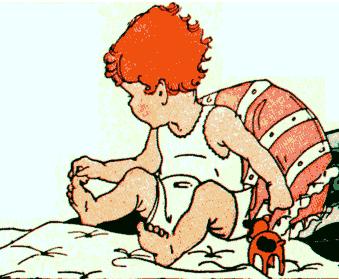 Mother
Goose Rhymes and Riddles
Mother
Goose Rhymes and Riddles
This little pig stayed at home;
This little pig had roast beef;
And this little pig had none;
This little pig said, "Wee, wee, wee!
I can't find my way
home."
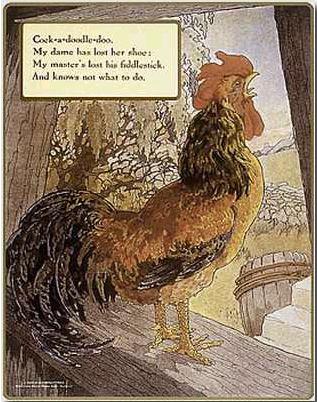
A peck of pickled peppers Peter Piper picked;
If Peter Piper picked a peck of pickled peppers,
Where's the peck of pickled peppers Peter Piper picked?
I met a man with seven wives;
Every wife had seven sacks,
Every sack had seven cats,
Every cat had seven kits;
Kits, cats, sacks, and wives,
How many were there going to St. Ives?
A-sailing on the sea;
And oh, it was all laden
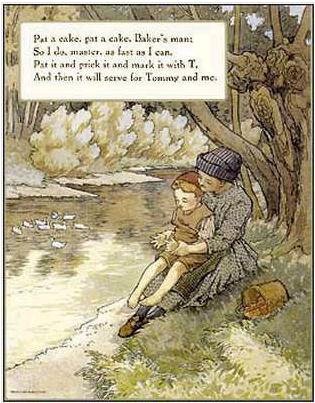 With
pretty things for thee!
With
pretty things for thee!
And apples in the hold;
The sails were made
of silk,
And the masts were made of gold.
That stood between the decks,
Were four and twenty white mice,
With chains about their necks.
With a packet on his back;
And when the ship began to move,
The captain said, "Quack, Quack!"
Tuesday's child is full of grace;
Wednesday's child is full of woe,
Thursday's child has far to go;
Friday's child is loving and giving,
Saturday's child works hard for its living;
But the child that is born on the Sabbath day
Is bonny and blithe, and good and gay.
The Adventures of
Pinocchio by Collodi
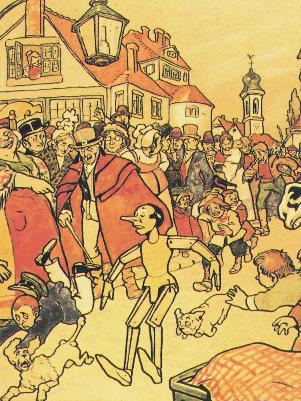 CHAPTER
1 How it happened that Master Cherry, carpenter, found a piece of wood
that wept and laughed like a child
CHAPTER
1 How it happened that Master Cherry, carpenter, found a piece of wood
that wept and laughed like a child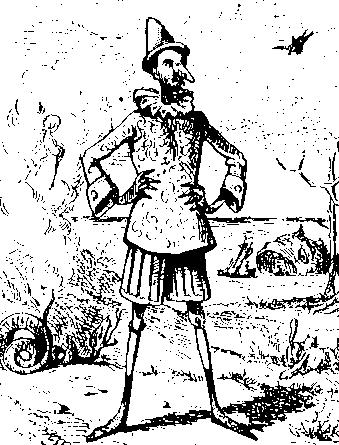 it
the first blow, he stood still with arm uplifted, for he had heard a
wee, little voice say in a beseeching tone:
it
the first blow, he stood still with arm uplifted, for he had heard a
wee, little voice say in a beseeching tone: 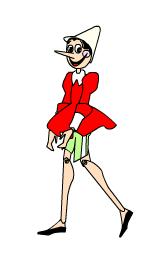 stuttering
from fright…
stuttering
from fright… The
poor fellow was scared half to death, so he tried to sing a gay song in
order to gain courage.
The
poor fellow was scared half to death, so he tried to sing a gay song in
order to gain courage.
Project Gutenberg Books Online
Rosetta Project Books Online